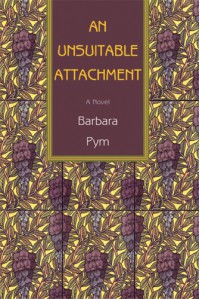Locus Amoenus: All By My Shelf
Watch the amazing Locus juggle several books at once, and try not to drop any! Free admission.
Currently reading



Final Thoughts: An Unsuitable Attachment

In terms of tone, this novel is somewhere between the two Pym works I've previously read: it has much of the lighthearted banter and witty observation of Excellent Women, but also a melancholy air akin to Quartet in Autumn.
The "unsuitable attachment" of the title is supposed to be that of John and Ianthe, but I felt that it actually extended to all the potential and actual pairings in the novel. Penelope, in particular, interested me: she seemed to be a character at a crossroads between tradition and modernity. Rupert calls her a "Pre-Raphaelite beatnik," which is a great way to describe the kind of societal limbo in which she exists. She has an interesting conflict with herself and her sister, constantly being pulled towards the traditional life path of marriage, but somehow knowing that she would be setting herself up for disappointment. Her sister's own marriage seems uninspiring, and it's not until Ianthe's wedding at the end that she seems to wake up to her own possibilities, should she stray from the beaten path. The final scene, however, leaves her in a bit of a cliffhanger situation.
Ianthe and John... well, that was an odd courtship. At one point I described him as stalkerish and creepy, and I wasn't convinced of his character. Once I'd finished the novel, I turned to Larkin's introduction, where he points out that John "seemed faintly threatening (‘ John had been intended to be much worse,’ Barbara wrote apologetically)." That made more sense.
As for the other male characters, a petty part of me can't help feeling that the way they're portrayed might have influenced the publisher's decision. As Larkin points out, his contact at the publishing house explained: "At that time we had two readers, both of whom had been here for many years: William Plomer and Daniel George. Neither then or at any time since has this company rejected a manuscript for commercial reasons ‘notwithstanding the literary merit of a book’." There's very little to commend any of the men in this novel, especially in their approach to their relationships with women. A few choice quotes:
- "‘Reading, were you?’ Rupert picked up the book which lay on the little table by the fire. It turned out to be the poems of Tennyson, bound in green morocco. Could she really have been reading that? he wondered, looking around for the novel stuffed behind a cushion."
- "How convenient women were, Rupert thought, accepting her offer, the way they were always ‘just going’ to make coffee or tea or perhaps had just roasted a joint in the oven or made a cheese soufflé."
- "not that he loved her but that he would like to see her always in his house, like some suitable decoration or finishing touch."
- "Now that he was left alone with the two women, both of whom (he imagined) rather admired him, Rupert felt a sense of power, though there being two of them rather limited the scope of what he could do – cramped his style, he might almost have said. In the end, after the tea had been made and drunk, there seemed nothing for it but to escort them home."
- "Rupert hardly knew what to say. If only he could take her to bed with him, he thought as they approached the pensione, so much might be smoothed out there. But perhaps it was just as well that circumstances made it impossible at this moment, for that might bring about even deeper complications."
- "within not much more than a month he – the meekest and kindest of men – had made a woman cry."
- "taking her by surprise so that she could not refuse a casual invitation to lunch."
The women aren't very helpful either: Sophia upholds the status quo, and even the seemingly progressive Penelope hangs on to ideas about her place in society. In the end, it's the apparently old-fashioned Ianthe who surprises them all by marrying for love instead of respectability. Whatever comes of her marriage, it feels like a spark of hope.
My one big criticism of the novel is the re-introduction of Everard and Mildred as a married couple. At the end of Excellent Women, the situation was undefined, and the reader left to contemplate possibilities. Here, a single phone call does away with any speculation. At the end of An Unsuitable Attachment, I'd like to keep to my own fantasies about Penelope's encounter with Rupert.
 3
3





